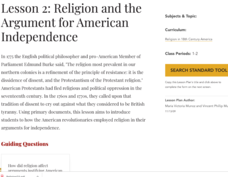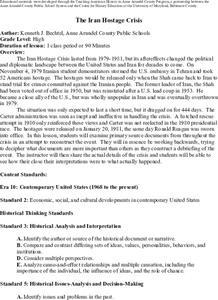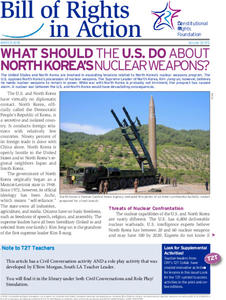Curated OER
Primary Source Analysis: 95 Theses Excerpts
By reviewing and analyzing these nine selected points from Martin Luther's 95 Theses, your young historians will discern the major tenets of the revolutionary challenge made against the Catholic Church in the seventeenth century. This is...
Curated OER
Lesson Plan for Japan
The effect of cultural beliefs on the progress and industrialization of a society is an interesting idea to consider, and this is certainly true in this lesson on feudal Japan. Your young historians will read informational texts on...
What So Proudly We Hail
The Meaning of America: Freedom and Religion
The United States of America was founded on firm ideals of both the pursuit of happiness and a spirit of reverence. Through a close reading of Nathaniel Hawthorne's "The May-Pole of Merry Mount," you can examine what some consider was a...
Digital History
Slavery and the Slave Trade
What would it have been like to have heard the debate on the issue of slavery at the Constitutional Convention of 1787? With this resource, you are given the opportunity to read through a reconstruction of speeches on the topic with your...
What So Proudly We Hail
The Meaning of America: Equality
What if society sought equality by handicapping the gifted and dispelling any traces of diversity? Kurt Vonnegut Jr. offers one possible answer to this question through his incredibly engaging and thought-provoking satirical...
Pulitzer Center
Revolution in Tunisia
How much do your pupils really know about the revolution in Tunisia? In order to inform your class and spark discussion, first create a country profile, comparing and contrasting Tunisia with the United States. Learners then analyze the...
Pulitzer Center
China's Rising Labor Movement
Young historians will explore the complex causes and effects of industrialization in China by perusing the numerous articles included in this webpage. Throughout the resource, there are many writing and discussion prompts to help direct...
National Endowment for the Humanities
Kennewick Man: Science and Sacred Rights
"Have respect for the dead!" Scholars investigate how science and religion often clash. As they look into the laws of science and the laws of religion, the legal ramifications at the federal level of both play into an argument they...
National Endowment for the Humanities
Lesson 2: Religion and the Argument for American Independence
Young scholars examine how religion affected arguments justifying American independence. They read and analyze primary source documents, and write an essay analyzing how Americans used religious arguments to justify revolution against a...
National Endowment for the Humanities
Lesson 1: The First Great Awakening
High schoolers examine the First Great Awakening and how it affected religious belief in colonial America. They read and analyze primary source documents, explore various websites, and write a five-paragraph essay examining the beliefs...
Center for History Education
The Iran Hostage Crisis
While the Iranian Hostage Crisis was a watershed moment, few history classes take on the complex series of events leading up to it. Using declassified documents, including a hostage's diary, young historians create their own reports to...
Center for History Education
Debating Social Security: Understanding and Evaluating the Social Security Act of 1935
With throngs of Americans out of work and hungry, Franklin D. Roosevelt made the bold move to establish a social safety net with programs such as Social Security. The move was—and still is—controversial. Using documents from the 1930s,...
Center for History Education
The Freedmen's Bureau: Success or Failure?
What is freedom? The United States grappled with the question at the end of the Civil War after four million enslaved people were freed. Using circulars and images from the Reconstruction period, individuals examine how successful the...
Center for History Education
Daily Lives of Slaves - What Really Happened?
The stories of enslaved people are preserved forever thanks to the Great Depression. Budding historians explore slave narratives gathered by a federal government initiative to discover what life was actually like for enslaved people....
National Endowment for the Humanities
Imperialism and the Open Door
After the United States emerged as a global power, it began to muscle its way into trading agreements with China. Using primary sources, budding historians examine the Open Door policy, which emerged during this time. Primary sources and...
National Endowment for the Humanities
Creating the Office of the Presidency
The United States needed an executive power, but it wanted to avoid a monarchy. Using James Madison's notes on the Constitutional Convention, young historians look at the juggling act the Founding Fathers did to create a role for the...
National Endowment for the Humanities
The Question of Representation at the 1787 Convention
While the Constitution is considered enshrined today, its current form is the result of haggling at a secret convention in 1787. Using transcripts from the meetings and various plans as drafted by the delegates, class members unpack the...
National Endowment for the Humanities
The Road to the Constitutional Convention
After defeating the most powerful nation in the world, the United States had to deal with its own weaknesses in the Articles of Confederation. Activities in the lesson include analyzing primary sources from the Founding Fathers to...
Constitutional Rights Foundation
What Should the US Do About North Korea's Nuclear Weapons?
North Korea, a shadowy nation distrustful of America, is working on a nuclear weapons program. What should the United States do? The question has plagued American presidents for years, but now young scholars get to make their...
Stanford University
King Philip's War
King Philip's War was the crescendo of a violent period between the Pequot and English colonists. Using documents from English settlers, including a contemporary report on the conflict, learners explore the little-known period. They then...
Stanford University
Boston Massacre
The Boston Massacre was a propaganda victory for those protesting British rule over the American colonies. By using images from Patriots, as well as the testimony of witnesses, scholars consider what may have happened on that fateful day...
Curriculum Development Institute
Political and Social Development in the Early Period of the Republic of China
The 1911 Revolution marked the end of China's imperial dynasties. Individuals consider the issues at stake using cartoons, graphic organizers, and discussion exercises. They then consider what came next in China's history and whether the...
Curriculum Development Institute
Reconstruction and Development in Japan after WWII
After World War II, Japan faced the task of rebuilding—under the watchful eyes of the Allies. Using a dice game and creative discussion strategies, class members consider the challenges facing Japan and changes the country underwent...
iCivics
DBQuest: The Nashville Sit-In Movement
What was it like to be a part of the sit-ins during the Civil Rights Movement? Learners consider the question and whether the protests were effective using an online documents-based investigation. The program allows for virtual...

























